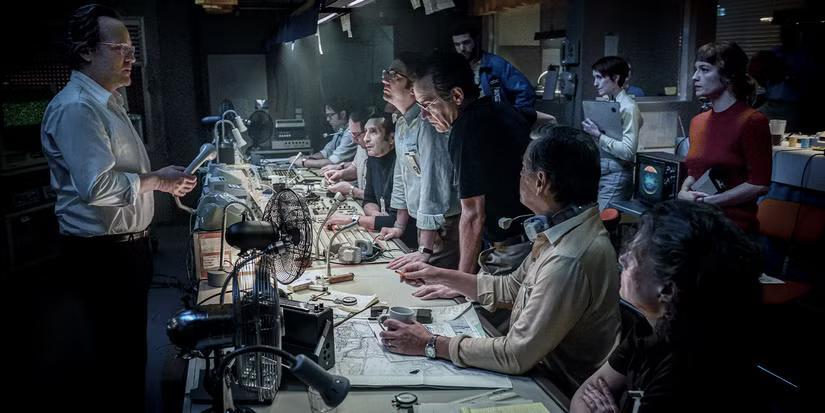My parents were glued to the screen. I definitely saw the footage and the Spielberg movie around the event. The 1972 Olympic massacre is one of the dark, dark global days…but in part because the situation was on TVs everywhere, where everyone could watch it. September 5 looks at that horrible day through the eyes of the people in charge of broadcasting that terror to the world. Yes, terrorist was first uttered on TV on this day.
We’re in an overnight shift on September 5 at ABC sports at the 1972 Munich Olympics. Geoffrey Mason (John Magaro) is going through the motions, planning the next days events with ABC president Roone Arledge (Peter Sarsgard) and ABC Sports Head Marvin Bader (Ben Chaplin). Marvin and Roone both leave for some sleep, leaving Geoffrey in charge with a few straggler workers including the key German/Hebrew translator Marianne Gebhardt (Leonie Benesch). Going outside for a tired smoke, Marianne hears what sounds like gunshots. In Olympic Village. Very close to the ABC sports studio. And many, many cameras ready to broadcast.
How do you make a thriller where we already know the ending like we do in September 5? Writer/director Tim Fehlbaum smartly posits that most people will find thrills in just assembling a news broadcast. Frankly, most journalism stories are about getting the story and end with a boring article in a paper/website: September 5 is unique because the story is unfolding in real time, and our journalists are using TV to tell the tale. The behind the scenes scrambling is riveting. I never knew that ABC news really wasn’t involved here; the Sports section of the TV channel handled all the unforgettable imagery viewers saw that day, pretty seamlessly. Watching the team build a broadcast elicits the same feelings of the Apollo 13 engineers helping filter out carbon dioxide, as we’re solving one little problem after another, building their version of a piece of art. Fehlbaum plants you inside that control room, claustrophobic and frantic as we’re running from place to place, relaying communication to various team members to make sure the info is true, real, and the sports news team has time to curate something presentable from the raw footage. We also learn about random period specific obstacles we didn’t know about: there was one news satellite all the networks shared, and CBS had a block Roone Arledge had to negotiate them out of as an example. Watching people be good at their jobs is always a satisfying experience, and on September 5 that success leads to the heart pounding, gripping tale that will have you on the edge of your seat for 90 efficient exciting minutes.
Anchoring this movie news broadcast is a series of well known faces that get an overdue chance to lead a brigade. John Magaro has been an excellent second fiddle for a long time, and here he’s excellent as the quarterback Geoffrey Mason, a level headed calm in the middle of all the chaos. Peter Sarsgaard and Ben Chaplin are excellent as the collaborating/dueling figureheads decision making for Geoffrey Mason. You feel their worn in push and pull as they know this is a big deal, and they try to tell the most exciting story possible without comprising the network or their own journalistic ethics at the same time. Leonie Benesch from The Teacher’s Lounge last year is the sneaky MVP for me, navigating a very American male news team while proving she’s smarter and more useful than any of them get credit for. But this is truly an ensemble work like a great news organization, as characters like a French cameraman (Zinedine Soulaem) or an undercover cameraman (Marcus Rutherford) each do their part to fill on the other characters and make the most of their screen time when they get it.
And when the devastating hammer drops, September 5 acknowledges those feelings. Amidst these brilliant newscasters doing an amazing job is a tragedy that forever haunts the world to this day. Without these amazing newscasters, none of us might ever have known, and for that I am grateful. Sad, but grateful.

